CALISTOGA, Calif. — Because of a collapsed and non-functioning sewer system and leaking water system, it could be some time, maybe several years, before significant use of the 70.6-acre fairgrounds property is viable. Repairs will cost millions.
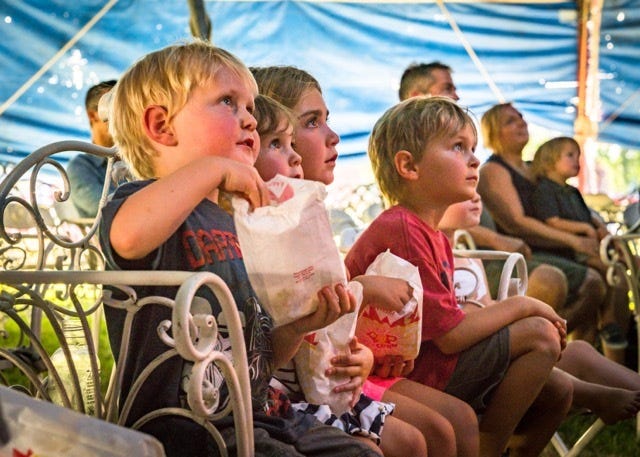
Although the Calistoga City Council is expected to approve spending $2 million to buy the property from Napa County at its Tuesday evening meeting, a staff report states that no city funds are available, except for reserve funds, for additional expenses at the property.
Calistoga mayor Don Williams estimates it will cost between $2 million and $3 million to upgrade the property’s infrastructure, including the sewer and water systems, and an additional $3 million to $5 million to revitalize the nine-hole Mount St. Helena Golf Course. He said opening the RV Park would cost “not so much,” adding it is “not likely the property would open tomorrow.” Williams said he understood the need for additional funds to improve the property from the beginning. “The community will need to step up to help us improve the fairgrounds,” he said.
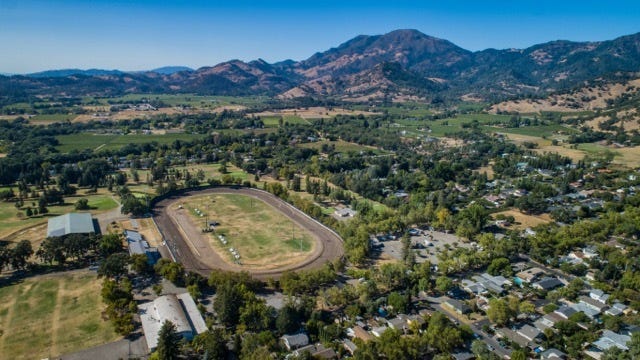
The purchase agreement restricts the use of the fairgrounds to activities that took place on the property during its long history, starting in 1935. Otherwise the agreement allows the county “first refusal” to buy the property back for roughly $2 million plus inflation and improvements. If the city leases any portion of the property for longer than 25 years, rezones it or seeks to sell it, the county can buy back the property. Those restrictions remain in place for 99 years. An additional restriction is that during declared emergencies, the county can use the property as an evacuation center, as it has done several times in the past.
In a letter to the Calistoga Tribune, former Calistoga Mayor Chris Canning said the buyback provision in the proposed agreement is a fatal flaw. In his letter, Canning writes: “The city will need significant resources and support to manage such a large endeavor. Public-private partnerships will be critical to its success, but the restrictive clause significantly limits this possibility.”
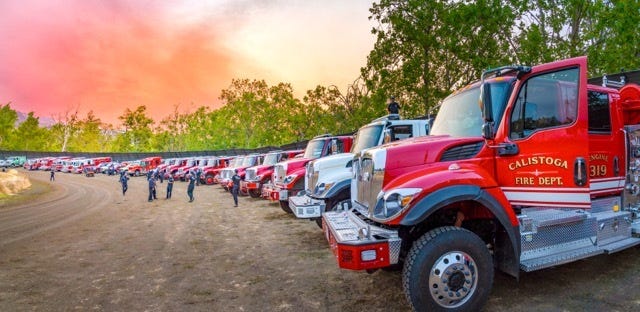
Latest effort to buy fairgrounds
This was the latest effort that Napa County and the city of Calistoga reached an agreement to sell the fairgrounds property. After the state withdrew its funding of all fairs in 2012, Calistoga sought to buy 34.3 acres of the fairgrounds property (all except the Mount St. Helena golf course) from the county in 2017-18. By May 2020, because of the financial pressures brought on by the COVID-19 pandemic, both the county and city terminated that agreement.
In the fall of 2021, city officials began negotiating with the county to buy the entire property and in October 2022 had reached an agreement to do so for $15.885 million, contingent on the passage of Measure E, a parcel tax measure on the March 7, 2023, ballot. Calistogans overwhelmingly did not support Measure E, which failed by a two-thirds vote.
Both Williams and council member Scott Cooper were part of a four-person negotiating team with Napa County that sought an agreement for Calistoga to buy the fairgrounds property. Williams said he worked on the issue “almost every day last year,” adding he had spoken to a lot of people who supported the city’s buying the property, which is in the center of Calistoga. He said the land is already owned by the public; what is changing with the sale is who manages it.
“If this land was on the open market, it would cost $15 to $20 million,” the mayor said, but it is not because its future use is restricted to public use only.
“That was the breakthrough piece of the negotiations with the county,” Williams added.
The city of Calistoga will pay a refundable $20,000 to open escrow on the property and will have four months to perform due diligence on the property, which will include an environmental inspection. Williams said the city has the $2 million needed to buy the property in the bank.
Additionally, the city council is expected to take additional steps Tuesday night, according to its staff report. They are: Create and recruit a fairgrounds revitalization director, contract with vendors to address landscaping and related maintenance on the property after the property transfer is complete, plan for the infrastructure necessary to reopen the RV park and determine budget savings to see if additional funds are available or if reserve funds will be needed to pay for additional expenses on the property.
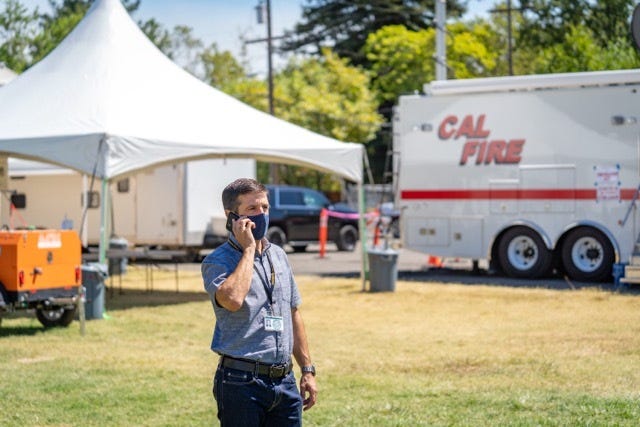
On Jan. 23 the Napa County Board of Supervisors voted unanimously to approve its resolution to declare the fairgrounds property surplus and to execute a purchase and sale agreement with the city of Calistoga.
For Napa County, the two negotiators were Supervisors Ryan Gregory and Anne Cottrell.
“This is a big day,” Gregory said. “I started this a few years ago with the prior negotiating teams and we never got there. But these two (Williams and Cooper) came in with fresh eyes and a spirit of community that I didn’t see before. It became clear to me that the community saw this as a gem that demanded investment, love and care, so we had to get it in your hands.”
Cottrell added the negotiations took a long time, and during that time she said she heard from so many members of the community about how important it is to have the fairgrounds property under the ownership and control of the City of Calistoga.
“Good luck to Calistoga,” she said. “Now the work begins. I encourage you to be thoughtful in the processes you set up to make the decisions. You have a lot of exciting and challenging decisions before you. I look forward to the way the county can support and partner with you going forward.”
A new vision
Calistogan Tim Carl, photographer, journalist and founder of Napa Valley Features, said he knows many people are concerned with the ongoing cost of maintaining the fairgrounds property. People want to do something with the property, he said, but he advocates letting the property revert to its natural state.
“I’m thinking, what does the world need right now?” Carl asked. “It needs good models for sustainability for communities. If we could take that land, the entire piece, and make it into an urban park in its natural setting, it would be a model for other communities to think about open space.”
Additionally, it would be inexpensive to maintain and a draw for tourism. An urban park in the middle of Calistoga could have an area for education, for example, or a butterfly pavilion.
“My contention is if it is done well, it could be very low cost and very positive,” Carl said. “It would be a draw for the entire world to come and experience what it is like to have an urban park that is completely novel. It would be a wonderful low-cost addition to our environment.”
He said he would take 50 acres and plant orchards, gardens, redwood trees and oaks.
“Make it part of a wildlife corridor,” he said in a recent interview. “Let the land go back to what it was 200 years ago.”
History of the Calistoga Fairgrounds, 1935-2024
The following is the history of the Calistoga Fairgrounds from 1935 to present.
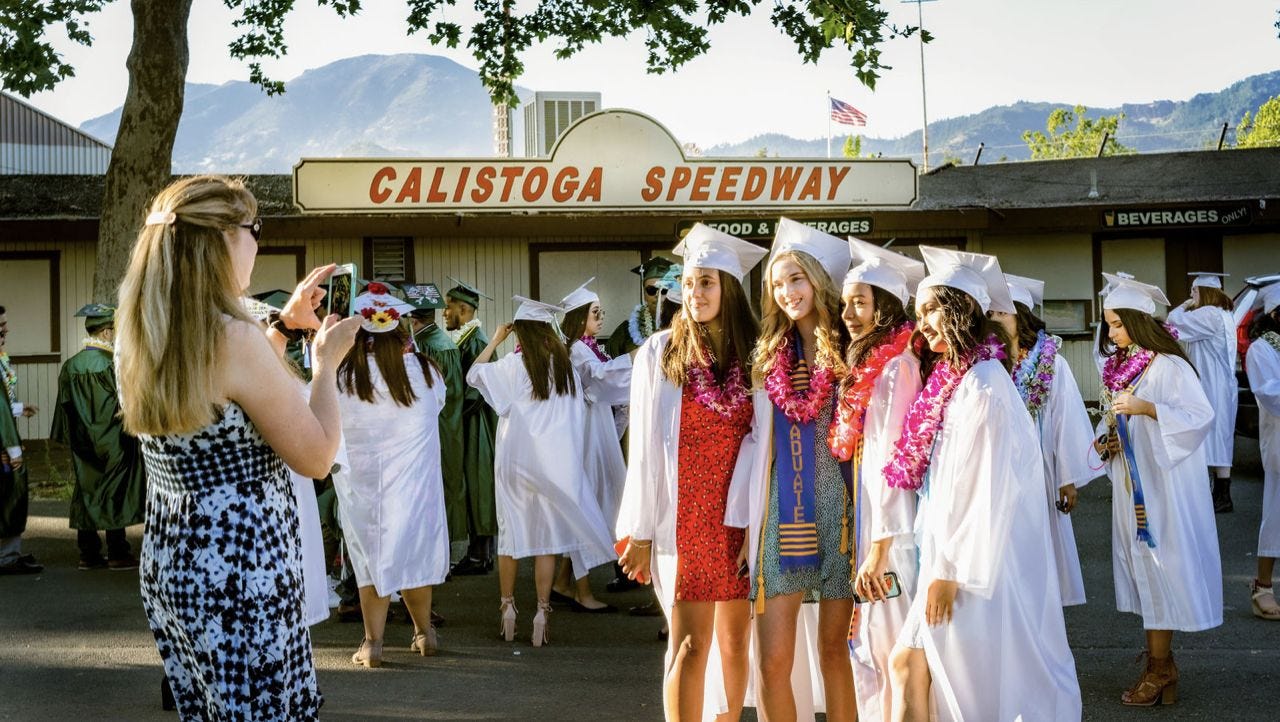
Oct. 8, 1935, incorporated as a nonprofit organization using the name of Calistoga Fair Association. It bought 32 acres of land for $10 as a permanent home of Napa County Fair. Between 1935 and 1976, Napa County acquired more land, ending up with 70.6 acres. As incorporated, the CFA had six purposes including “sponsoring, promoting and conducting livestock and agricultural fairs, festivals and exhibits of every description, also horse shows and horse races.”
1937, a half-mile oval track was built for horse racing. The following year Charlie Curryer, a former motorcycle racer turned promoter, brought race cars to the track.
1937, Louie Vermeil (1906-1987) opened Owl Garage behind his family home on Washington Street, Calistoga. He moved to Calistoga in 1926, when he was 20 years old, and married Alice Wilson in 1932.
October 1938, the first auto race was held and included a car owned by Vermeil, who spent the next 50 years participating in and running the Calistoga Speedway.
1945, first adoption of the Calistoga Fair Association bylaws.
After World War II the American Racing Association became the Northern Auto Racing Club, which later became today’s King of the West series.
1950, Vermeil claimed the American Racing Association car owners’ championship. Five years later, he became an ARA official. In 1960, Vermeil was one of the founding fathers of the Northern Auto Racing Club, replacing the defunct ARA. He was club president from 1965 to 1985.
1950, lights were put up around the track so the Calistoga Wildcats could play football in the infield and races could be held at night. Before 1950, all the races were held during the day.
1960-1990, Calistoga Speedway was NARC’s home track. Races were held 12 times a year. The races attracted drivers known for their success at the Indianapolis 500, including Bob Veith, Johnny Parsons, Fred Agabashian and Jim Hurtubise.
1960-1980s, Louie and Alice Vermeil were famous for their hospitality and generosity. The Owl Garage was open at all hours for racers to work on their cars, and Alice provided an endless stream of food and wine. They raised four children, and their son Dick put posters on utility poles to promote the races and drove the water truck prior to the races. As youngsters, both he and Stan worked as mechanics in their father’s garage. Alice ran the ticket office, while Carol, Dick’s girlfriend, now wife of 64 years, presented trophies to the winners.
1969-1971, bylaws were amended to change the name to Napa County Fair Association.
1972, the association amended its purpose to just two from six, including “stimulating and promoting better breeding of horses and livestock in Napa and Sonoma counties in the area served by the U.S. Post Office in Calistoga,” and “sponsoring, promoting and conducting livestock and agricultural fairs, festivals, and exhibits of every description, also horse shows and horse races.”
July 6, 1974, Rich Gentes drove Vermeil’s “Vermeil Offy,” sprint car to victory at the Calistoga Speedway. It is believed that was the last time a sprint car powered by a dual overhead cam four-cylinder Offenhauser engine won a main event in the United States The car was built in 1959.
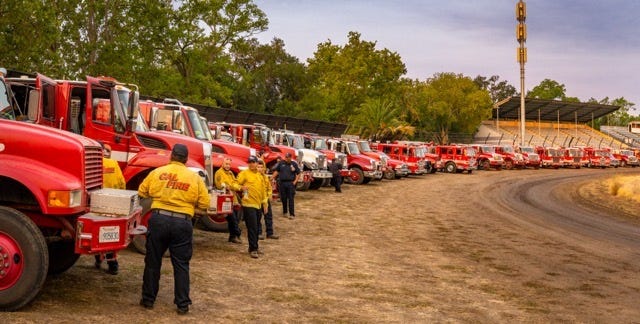
Early 1980s, four people, including this reporter, the owners of The Weekly Calistogan and several other Calistogans rode in and on a 1930s Model B flatbed pickup truck in the annual Silverado Parade, later called the Fourth of July Parade. On the pickup truck was the famed Indian musician Korla Pandit. At that time the parade ended at the gates of the annual Napa County Fair.
1982, Northern California’s Motoring Press Association named Vermeil “Motorsportsman of the Year” and inducted him into their Hall of Fame five years later.
1986-2011, the Napa County Fair Association amended its bylaws six times.
2012, after more than 75 years of providing funding, the state stopped supporting its fairs. For 2010-2011, the diminishing funds came from the state’s general fund. For the NCFA, it meant a loss of nearly 20% of its operating revenues, money used to support capital improvements, major maintenance repairs and community programs.
Sept. 21, 2012, the NCFA amended its articles of incorporation to change its purpose to a charitable 501c3 public-benefit organization. The following year the NCFA ratified new bylaws.
2013, hundreds of thousands of dollars were spent on a much-need facelift of the Calistoga Speedway. New clay was added to the racing surface, a state-of-the-art catch fence was installed all around the track and the speaker system was revamped with state-of-the-art speakers. Funds came from an anonymous donor.
February 2014, Tommy Hunt, the former Calistoga operations manager, was named promoter of the Calistoga Speedway. Hunt had been involved with the Calistoga Speedway for years and was founder of Hunt Motorsports Concepts.
2014, the NCFA redefined its concept of a county fair from a single, multiday event into a yearlong celebration with three events, including the annual Fourth of July fair, a summer celebration of the valley’s Hispanic community’s culture and the group’s New Year’s Eve dinner and cocktail party.
2017-18, Calistoga and Napa County negotiated for the city to buy 34.3 acres of the fairgrounds’ property, which included all of the land except the Mount St. Helena Golf Course.
2018, the nonprofit group Napa County Fair Association that ran the Napa County Fairgrounds declared bankruptcy.
Sept. 1, 2019, Rutherford’s Rico Abreu won the Louie Vermeil Classic at the Calistoga Speedway. It was the last race held at the speedway. Abreu, 31, is a professional dirt-track and sprint-car racing driver. According to Speed Sport, Abreu won a Jan. 1, 2024, race at Australia’s Bunbury Speedway.
2019, Napa County Fair Association restructured with new brand, Celebrate! Napa Valley, and new mission: “fundraising to improve the quality of the programming and entertainment provided through the year,” according to Celebrate! Napa Valley. In 2021, it presented the December Christmas Faire; the following year, it presented the Fourth of July Parade and Star Spangled Social, a bigger Christmas Faire and two new events, a Harvest Fair and Tractor Parade After Party. It is supported in part by the Napa County Arts and Culture Commission.
Dec. 2, 2019, Napa County, owner of the Calistoga Fairgrounds property, closed the nine-hole Mount St. Helena Golf Course, located at 2025 Grant St.
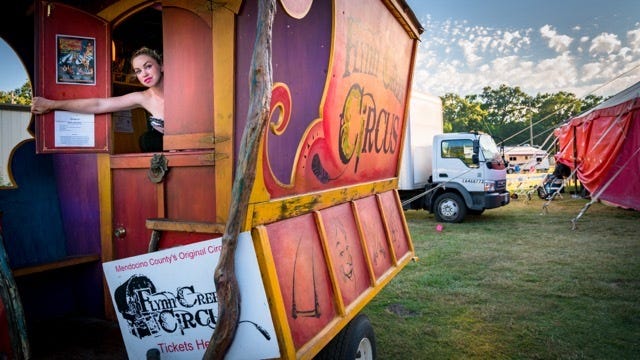
March 2020, Napa County Board of Supervisors agreed to let Tommy Hunt put on three races at the speedway. None were held because of closures of many facilities due to the COVID-19 pandemic.
May 2020, both Calistoga and Napa County officials terminated the agreement for Calistoga to buy the 34.3 acres because of the unprecedent financial conditions associated with COVID-19 pandemic.
Fall 2021, Calistoga officials reached out to the county to see if the city could buy the entire 70.6-acre parcel, which included the Calistoga Speedway, Fairgrounds property, Mount St. Helena Golf Course, pro shop and two residences.
October 2022, officials from Napa County and the city of Calistoga agreed to a $15.885 million purchase price ($225,000 per acre) for the 70.6-acre Napa County Fairgrounds property. The sale was contingent on the passage of Measure E, Calistoga’s parcel tax measure.
March 7, 2023, Calistogans overwhelming voted to defeat Measure E, which would have raised $4 million per year and an estimated $27.5 million over the life of the parcel tax.
2023, Tommy Hunt, his family and HMC Promotions Inc. begin an email campaign, asking city and county officials to finalize an agreement to transfer the ownership of the Napa County Fairgrounds to Calistoga. Hunt and others sought to hold the 14th Annual “Louie Vermeil Classic” on Labor Day at the Calistoga Speedway. The 2022 edition of the classic was held at Chico’s Silver Dollar Speedway.
Jan. 23, 2024, Napa County Board of Supervisors voted unanimously to sell the 70.6-Napa County Fairgrounds to the city of Calistoga for $2 million, with several restrictions on zoning and land use. The city of Calistoga is expected to approve the agreement at its meeting on Tuesday, Feb. 6.
— The history was compiled from several sources and websites, including Napa County, articles by Bill Sessa and Pat Sullivan in Speed Sport magazine, Rico Abreu and his RAR website, Napa County Fair Association and its successor, Celebrate! Napa Valley websites, the National Sprint Car Hall of Fame and Museum, Hunt family and HMC Promotions Inc. website.
If today's story captured your interest, explore these related articles:
Dave Stoneberg is an editor and journalist who has worked for newspapers in both Lake and Napa counties.


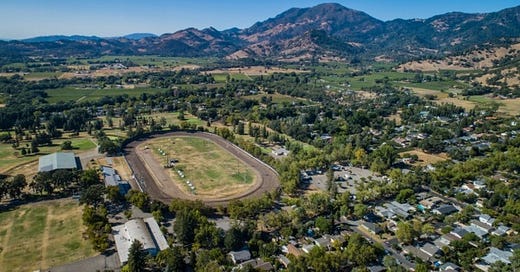


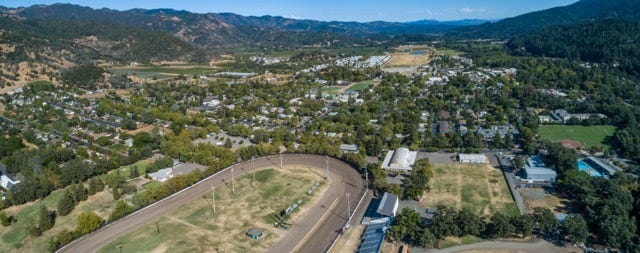

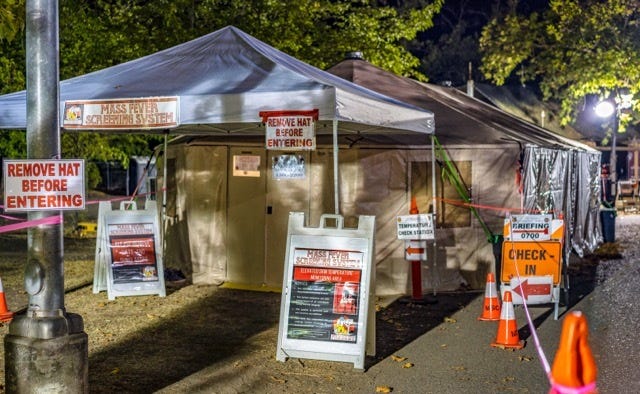
Start with the RV park. It would be the quickest revenue stream.
Thanks for the history. I sure appreciate having grown up here with the fairgrounds and all the events hosted there. I feel some of your current dates are incorrect. It was more like 2016, 2017 that the ncfa took on the Christmas Faire, Engage art fair and other annual events. Karan Schlegel would be a good person to check with.